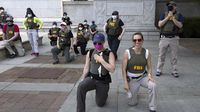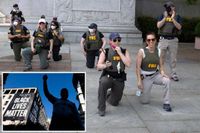The FBI has reassigned several agents who were photographed kneeling during a racial justice protest in Washington, D.C., following the 2020 death of George Floyd, according to sources familiar with the matter. This decision has reignited discussions about the agency's internal culture and its response to political pressures.
The reassignments come amidst a broader personnel shake-up under Director Kash Patel, who has been implementing significant changes since taking office. Deputy Director Dan Bongino has sought to reassure supporters of former President Donald Trump, emphasizing that the bureau is addressing concerns about perceived bias within its ranks. In a recent post on X, Bongino stated, "The Director and I are working on a number of significant initiatives to ensure that the mistakes of the past are never repeated, and that many of your open questions are answered." However, he did not elaborate on what those mistakes or questions were.
The agents in question were part of a group photographed taking a knee during the protests that erupted in June 2020, a gesture that some viewed as a necessary de-escalation tactic during a time of heightened tension and potential violence. However, others interpreted it as a political statement. The agents were not punished at the time, and an internal review concluded that no policy violations had occurred.
Despite this, at least four of the kneeling agents have now been reassigned to positions seen as demotions, moving from senior roles in counterintelligence, counterterrorism, and cybercrimes to lesser positions within the bureau. The reasons for these transfers remain unclear, as the FBI has declined to comment on personnel matters.
Critics of the reassignments have expressed concern over the implications for the bureau's integrity. A former FBI official remarked, "This notion that the bureau would go after these people, it's just disgusting." The changes come amid reports that the Trump administration sought to investigate and remove senior FBI officials involved in investigations deemed unfavorable to the former president.
Former Representative Matt Gaetz (R-Fla.) has also weighed in on the situation, alleging that some of the kneeling agents previously received promotions and favorable opportunities within the bureau. He criticized the agents' actions, stating, "To climb the ladder in federal employment, you shouldn’t have to shimmy up the woke totem pole," and called the kneeling behavior "demoralizing." Gaetz argued that law enforcement's primary purpose is to ensure public safety, not to engage in political gestures.
The kneeling incident occurred on June 4, 2020, as nationwide protests erupted following Floyd's death at the hands of former Minneapolis police officer Derek Chauvin, who was later convicted of murder for kneeling on Floyd's neck for over nine minutes. The protests sparked a national reckoning over policing and systemic racism, leading to widespread calls for reform.
While the FBI agents were deployed to protect federal monuments during the protests, their decision to kneel was influenced by a similar gesture made by National Guard soldiers, which had successfully de-escalated tensions in another situation. However, after the photos were published, some agents faced backlash from their colleagues, including personal attacks and ostracization.
Many within the FBI defended the kneeling agents, arguing that their actions helped avert potential violence and protected the bureau's reputation. Yet the reassignments have raised questions about the agency's current leadership and its approach to internal dissent.
A 2024 report from the Department of Justice's inspector general noted that the FBI's response to civil unrest lacked adequate planning and guidance, which contributed to safety and security risks for both agents and the public. This has further complicated the narrative surrounding the kneeling incident and the subsequent personnel changes.
As the FBI continues to navigate the fallout from these events, the reassignments of the kneeling agents serve as a stark reminder of the complex interplay between law enforcement, politics, and public perception. The agency's actions in this case will likely be scrutinized as it seeks to rebuild trust with both the public and its personnel.
In summary, the FBI's recent reassignments of agents who participated in the kneeling gesture during the 2020 protests reflect ongoing tensions within the bureau and highlight the challenges of balancing political pressures with the agency's mission. As discussions about the FBI's culture and practices continue, the implications of these personnel changes will be felt both within the agency and in the broader context of law enforcement in America.





